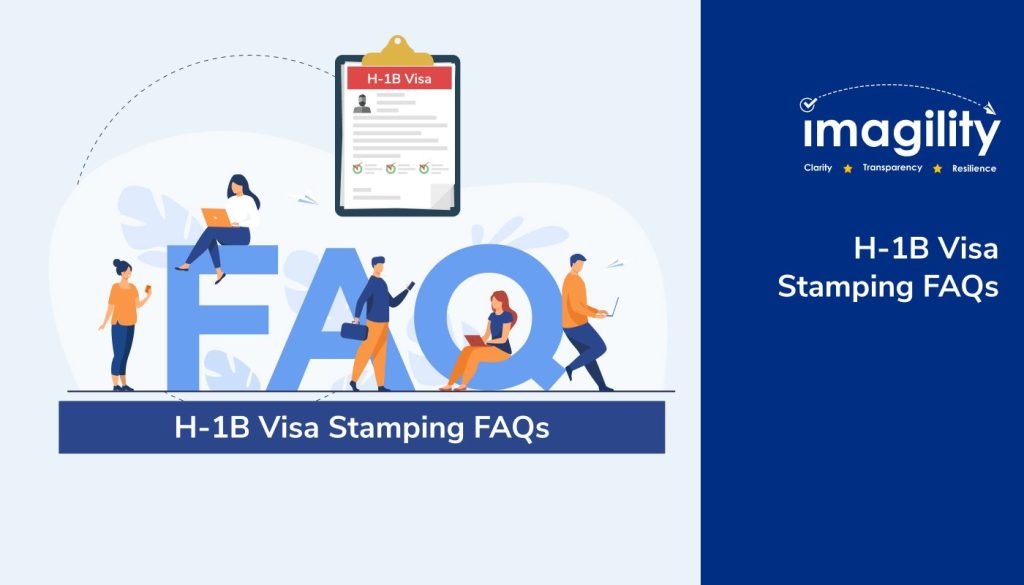The H-1B visa is a popular non-immigrant visa that allows U.S. employers to temporarily employ foreign workers in specialty occupations. Once an H-1B petition is approved by the U.S. Citizenship and Immigration Services (USCIS), the next step is often obtaining an H-1B visa stamp from a U.S. consulate or embassy abroad. However, navigating the H-1B visa stamping process can be complex and confusing.
To help clarify some common questions, we’ve compiled this FAQ guide:
- What is H-1B Visa Stamping?
When you get an H-1B visa, your visa must be endorsed, which is by obtaining a physical visa stamp in your passport from a U.S. consulate or embassy abroad. This process is called H-1B visa stamping and this stamp allows you to enter the US in H-1B status.
- When Should I Apply for H-1B Visa Stamping?
You should apply for visa stamping after your H-1B petition is approved by the USCIS. You must start this process around 90 days before the day on which you have to start working in the US.
- Where Can I Attend the H-1B Visa Interview?
A U.S. Embassy or a Consulate in your home country is where you must attend the H-1B visa interview. The place where you must appear for this interview will depend on your country of residence and the consulate or embassy responsible for processing visa applications in that region.
- What Documents Do I Need for the H-1B Visa Interview?
The specific documents required for the H-1B visa interview may vary depending on the consulate or embassy where you’re applying. However, common documents include:
- Passport valid for at least six months beyond your intended period of stay in the U.S.
- Form DS-160 confirmation page (Non-immigrant Visa Application)
- H-1B approval notice (Form I-797)
- Employment offer letter from the sponsoring U.S. employer
- Proof of educational qualifications and professional credentials
- Financial documentation demonstrating your ability to support yourself in the U.S.
- Additional supporting documents as requested by the consulate or embassy
- What Happens During the H-1B Visa Interview?
During the H-1B visa interview, a consular officer will assess your application and inquire about your background, qualifications, and planned employment in the United States. It is crucial to provide clear and truthful responses to the officer’s questions in order to facilitate the evaluation process.
- What are some red flags that consular officers may look for during the H-1B visa interview?
Conflicting answers, breaks in work history, and differences between what you say and what is in your documents, are some things consular officers might look for. They might also look for things like not being ready or knowing enough about your job, and any signs that the information you provide isn’t truthful. They could also pay attention to your body language and how you act, if they think you are not trustworthy during the interview.
- What are some of the reasons for not performing well in the visa interview?
Some common reasons include inadequate preparation, misunderstanding visa requirements and procedures, nervousness, difficulty articulating responses clearly, providing inconsistent or contradictory information, not having sufficient supporting documentation, and failing to demonstrate ties to your home country, indicating an intention to stay permanently in the U.S.
- What Should I Do if My H-1B Visa Application is Denied?
If your H-1B visa application is denied, the consular officer will provide you with a written explanation of the reasons for the denial. You may have the option to reapply for the visa, address any deficiencies in your application, or seek legal advice to explore other options.
- When can I enter the US with my H-1B visa?
Once your H-1B visa is stamped, you can get into the US, around ten days before the start date of your job. You may not be allowed to enter the U.S. before that.
Conclusion
Navigating the H-1B visa stamping process can be challenging, but with proper preparation and understanding of the requirements, you can increase your chances of success. If you have specific questions or concerns about your H-1B visa application, it’s recommended to consult with an experienced immigration attorney for personalized guidance and support.
We recommend you to stay informed and be proactive throughout the H-1B visa stamping process to ensure a smooth and successful outcome.
Helpful Resources on H-1B Visas
The H-1B Playbook
H1B Visa Stamping Made Simple: A Step-by-Step Guide
Everything You Need to Know About the H-1B Visa Application Process
H-1B Visa Processing Time: What You Need to Know
H-1B Registration Process
Comprehensive Guide on H-1B Visa Petitions
H-1B Lottery 2024 (FY2025): Recent Trends and What to Expect
H-1B Visa FAQs
Tips for Successful H-1B Visa Interviews
H-1B Visa Extensions through Imagility: Process and Timelines









